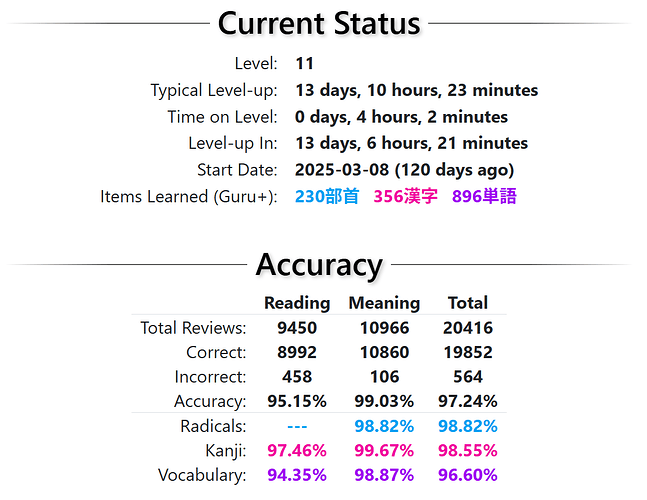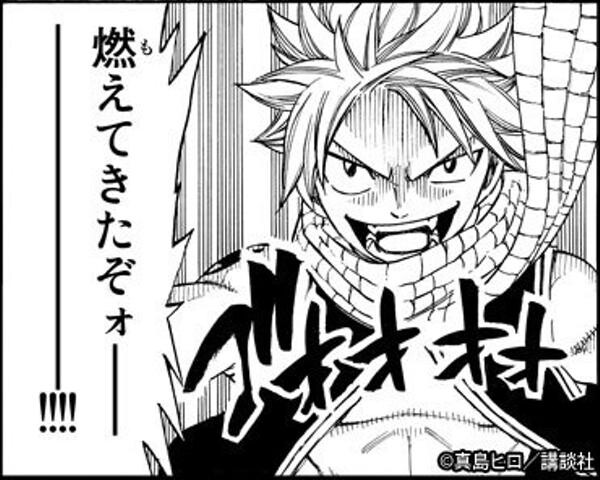Me
I’m British, living in London for nearly forty years. Native language English. I’m studying Japanese for the challenge and in part for the mental exercise of wrapping my brain around another way of thought.
I was always mediocre at languages at school, with my major studies having been in the sciences. This is a chance to see if a lifetime of learning has taught me enough to be able to pick up a very different language to my first.
I want to start my journey through listening and reading, and move on to speaking and typing at a later date. I’ve started out on Duolingo but it doesn’t feel the right route for me, and it doesn’t explain the grammar at all well. So, I came here six weeks later to look into WaniKani.
My Japanese, Month 3
A month ago, I wrote up my study plan and the time has come to report on how the month went.
https://community.wanikani.com/t/i-have-a-cunning-plan/69898
I started the month having just completed level 3 WK, and was looking to get a subscription if I decided to plump for WK as my kanji learning programme.
Month 3 targets:
- Develop a better feel for rhythm, pitch, tough vowels and consonants, including diphthongs, devoicing and r/g weirdness.
- Build reading speed?
- Look into font changes?
- Around another 300 words (2 WK levels?).
- Spend a few days on a basic grammar other than Duolingo. (Tae Kim or Misa?)
I decided WK was for me (hence this log). Although rtk is probably faster, my primary learning modes are for listening and reading, whereas RTK seems to focus on reading and writing. WK teaches readings and there are sound files and pitch indications, so as well as being a good primary route to get a leg up to start reading, WK will serve as a second source for help with listening. I also rate the fact of a community very highly for my motivation. The lack of an official Duo community is one reason I dropped it as my primary learning vehicle.
I bought a one year licence as I expect to learn to at least level 20 and more likely 30. After a year I will have a pretty good idea what the right balance between learning by reading and SRS-style memorization should be for me.
Goal 1:
Develop a better feel for rhythm, pitch, tough vowels and consonants, including diphthongs, devoicing and r/g weirdness.
I’m not doing as well as I would like on rhythmic reading of sentences to get that metronome-like spacing of mora. I’m still so slow in actual reading, I can’t manage even small sentences evenly. I switched the pitch indicators on in WK, and have watched Dogen’s free videos. I only wanted to give myself a leg up for later, so I thought that might be enough. I might want to add 10 minutes kotu pitch exercises to a daily schedule, once I’m organized enough to have a daily schedule.
I looked up several sources to help with the pronunciation of “r”, “n” and “g”. G sounds didn’t seem to be the issue I’d thought, but ん was probably more difficult to make up for it. I think as I listen more, it will come better. I did find some rules on when to devoice, but I’m not sure how broadly they apply. It’s also a problem with WK, because I messed up with my typing a few times; by not voicing the i or the u in my head, my fingers didn’t type them in romaji either. I’ll think about this. WK might not be the best place to try getting vocabulary pronunciation right. I’ve decided not to worry about pronouncing the diphthongs.
A mixed bag: I think I’ll give myself 3 out of 5
Goals 2 and 3
Build reading speed?
Look into font changes?
I took community advice and shelved these.
Goal 4
Around another 300 words (2 WK levels?).
Well I did all of level 4, have done lessons on all but 35 vocab on level 5 and all level 6 radicals and kanji as compensation for the missing 35 vocab. My level ones are hitting enlightened. So I’d say yes to the two levels of WK, but no to the 300 words. I probably managed 250 and some of the WK words were duplicates of words I learned in Duolingo.
Speaking of Duo, I throttled right back this last week, losing my 86 day streak on purpose. I don’t have the time I would like to spend on WK and grammar, and I don’t need Duo’s transparent manipulation with streaks. It’s just an unasked for monkey on my back — I get to choose my own monkeys, thank you!
All in all maybe 4/5.
Goal 5
Spend a few days on a basic grammar other than Duolingo. (Tae Kim or Misa?)
I did a bit on both Tae Kim and Misa. I spent the time, but it just didn’t go far enough. My write up screeches to a halt half way through basic adjectives. I think this is going to be a continuing goal over the next month. 3/5 at best.
Other Things
I downloaded a vocabulary audio file to my phone to listen to on repeat, then promptly lost my headphones somewhere. I’ll pretend I could do with some new ones anyway.
I tried out Busuu as a Duo alternative. I’m not sure I’d be gaining much in switching.
Month 4 Targets
1/ Two more WK levels
2/ Finish my basic grammar notes
3/ Use koto daily for 5/10 mins pitch training to make hearing pitch changes more automatic.
4/ Search for the primary listening programme that can help me get to the point where I can watch simple anime and understand most of it. It should complement WK and also help with reading and grammar if possible. I’m wondering if should use Satori Reader to just read to me. Perhaps that’s a good way in, even if I don’t have the vocabulary yet to take full advantage. I can also look for simple audiobooks.
5/ Find the right level of effort in Duolingo. Maybe ditch it entirely if I can find something good enough to complement WK as a listening/grammar vehicle.







